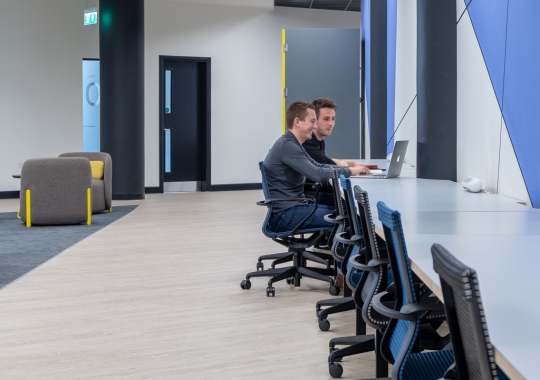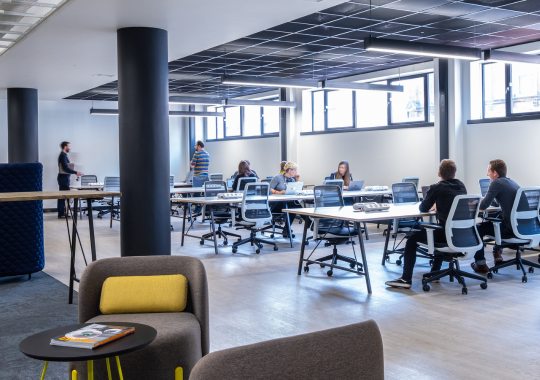TEDx Brayford Pool Salon - The Way We Work
30.05.22 NEWS
TEDx Brayford Pool Salon visit Mosaic.

Last Saturday Mosaic saw their collaboration with TEDx Brayford Pool Salon come into fruition. We are proud to have hosted the first event of their 2022 Series The way we work.
The event kicked off with a tour of Mosaic - it was a pleasure to be able to show our space to so many people and be able to share our vision for Lincoln's Digital Hub.

The heart of the event was two Fishbowl discussions with our panels the premise of which was an open discussion around a topic and question set by TEDx. The audience was able to observe and listen before discussing the topic amongst themselves. The discussion concluded by going back to the panel for their reflections and closing statements.
The first panel consisted of our very own Mosaic Engagement Manager Ben James and Mosaic member Richard Hill, CEO & founder of eComOne and SEOTrafficLab. Alongside them were Ruchi Aggarwal, Director of Business Development at Lincoln International Business School; Katy Baggott, Executive Development Coach; and Laura Mallaburn, Head of Business Support at Lincoln Science & Innovation Park and Angel Network Manager at Lincolnshire Business Angels.

Fostering Global Talent
After hearing from Matt Mullenweg, CEO of Automattic about his distributed workforce we put the question to our panel: How do we foster global talent?
Ruchi gave us a really interesting insight; Lincoln is evolving, and we are now enticing more international talent, but we need to learn to embrace it and build a welcoming culture, investing down into our education in teaching children and young people inclusion. Ben also reminded us that the Council are continually investing and promoting Lincoln as a great city, but we need to be proud of our city and show that it is the place to be. Most importantly we need to foster a global mindset and continue to build up and promote the whole of Lincolnshire, not just Lincoln. The audience also reminded us how important it was to nurture local talent, as many often feel they must head to bigger cities to grow.
Tying up the first discussion, Ruchi encouraged us to get out of our comfort zones and find new people and opportunities. She added that to succeed in Lincoln you need to grow your network and your influence. Richard also reminded us that lots of companies have events and opportunities you can get involved in - you just have to be on the lookout.
Encouraging Future Leaders
We then learnt more about effective leaders in a crisis from Leadership expert Amy C. Edmondson and explored: How do we encourage future leaders?
Upheaval is inevitable so leadership is always needed in all areas of business. Defining leadership Ruchi explained, “A leader is someone you chose to follow because you can't get where you want to go alone". Everyone is a leader, an expert in their own field and essential to progress.
Katy expanded on what it means to be a great leader; transparency, authenticity and humility are all key. She also highlighted that it is important that we support, advocate and champion others.
From the audience, it was clear that a defining feature of leadership was the ability to make decisions and have that final say in difficult situations. It was also noted that there is no such thing as a perfect decision but good leaders adapt well and take on collaboration. In summary, Laura explored the need for leaders to be open and compassionate in their collaboration with others. Katy reminded us that collaboration must influence the decisions of leaders for it to be effective; a leader's role is to "be a compass, not a map".

After a short break and snacks, we reconvened with our second panel: Mosaic Member Simon Akers, Founder of Archmon, Freelance Marketing Strategist and workplace mental health advocate was joined by Owen Lewis, Employability Leader at Lincoln City Foundation; Sue Liburd MBE, Human Capital Innovator and Strategy Consultant: Andy Senyszyn, Business Manager at Social Change UK; and Jo Tolley, International Disability Consultant.
Cultivating Open Culture
Michael C. Bush, Equity Visionary and CEO of Great Place to Work, surveys many workers and found that happy workers generate greater revenue. Their research shows that happy workers are trusted, respected, treated fairly and listen to. The question was put to the panel: how do we cultivate an open culture?
Sue made a really interesting point that open culture comes from a place of privilege; we must remember that it requires job security and physiological safety. Simon reminded us that Leaders have a responsibility to cultivate openness; they must be open and transparent themselves and tap into individuals and their personalities to make the most of workers. We often forget that individuality can be an asset; Sue highlighted the need to think about who we are inviting to the table as "those who contribute to the building are less likely to tear it down."
The audience focus was on our differences; as everyone will have a different level of openness, we need to be aware and understanding of this. We need open cultures that are accepting, make space for everyone and encourage building each other up through collaboration and teamwork. Owen encouraged us that open culture is an ongoing process; it will need to adapt and evolve over time with the workers and the work. Jo reminded us of the importance of new perspectives and diversities. Sue emphasised that "we need to design with people, not for them." A useful tool in this is feedback and Andy pointed out that leaders must invite feedback and constructive criticism.
Creating Equity
Finally, we heard from ACLU Chief Equity Officer Amber Hikes about the importance of lifting others as we climb and not getting into a mindset of success for success's sake as "there is no point being the first if you are also the last." With that in mind, we asked our panel: How do we create more equity?
Simon reminded us that it starts with self-work; we need to recognise our privilege. Companies must represent the communities they are in because this also makes the world a better place, and the better the world the better the work. Owen explained that we need to be prepared for discussion and for change; organisations need to make space for conversations and more importantly listen, as "We need the right people at the right tables." Jo made an important point that even within minorities there is diversity; we cannot expect one to be a spokesperson for all. We must remember that this is everyone's responsibility; we need to learn to be active allies, speaking up and out for others.
The audience pointed out that we also need to remember neurodiversity, it is often overlooked and stereotyped, but without it we lose individuals who have unique ways of observing the world. Owen pointed out the importance of leadership and workforces that look like who we are, what we are and what we need. Simon noted that many organisations need a complete culture shift; it's not about representation on one day a year but permanently embracing and dedicating themselves to real ongoing change. Jo made us aware that inclusivity is not something you do; you either are inclusive or you are not. Often the first step is just to admit when you don't know or understand. As Owen said "it's okay to have no idea" - that is the start of progress.
Overall the event was thought-provoking and a great testament to host and discussion mediator, Andy Farenden. It was a great experience and a joy to be part of. If you missed out on this event there is still a chance to get tickets for the rest of the 2022 series here.


